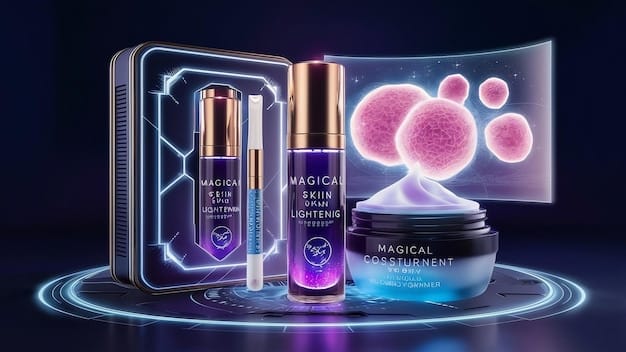Peptides Power: Unlock Collagen Boost for Youthful Skin

Peptides are short chains of amino acids that act as messengers in the skin, signaling cells to produce more collagen and elastin, leading to improved firmness, elasticity, and a more youthful appearance by combating signs of aging.
In the expansive and often overwhelming world of skincare, a particular ingredient class has risen to prominence, captivating both scientific researchers and beauty enthusiasts alike: peptides. Understanding the true potential of peptides power: how these skincare ingredients can boost collagen production is key to unlocking a more youthful and resilient complexion. Far from being just another fleeting trend, peptides represent a fundamental advancement in dermatological science, offering a targeted approach to address one of the most persistent concerns in anti-aging skincare: the decline of collagen. This article delves deep into the fascinating science behind peptides, exploring their mechanisms of action, diverse benefits, and how they can be strategically incorporated into your routine to revitalize your skin’s natural scaffolding.
The Molecular Marvels: What Exactly Are Peptides?
Peptides are essentially fragments of proteins, composed of short chains of amino acids linked together by peptide bonds. They are the building blocks of proteins, and in the context of our skin, they play a crucial role as signaling molecules. Think of them as tiny messengers, capable of communicating instructions to our cells.
While proteins are larger, complex structures, peptides are smaller and more agile, allowing them to penetrate the skin’s outer layers more effectively. This unique characteristic is what makes them so powerful in topical skincare applications. Their ability to deliver specific messages to skin cells is what sets them apart from many other ingredients.
The human body naturally produces various types of peptides, each with a distinct function. In skincare, cosmetic chemists have harnessed this biological wisdom, synthesizing specific peptides to target particular skin concerns. These synthetic versions mimic the action of natural peptides, instructing skin cells to perform beneficial functions.

Decoding the Alphabet of Amino Acids
To fully grasp the magic of peptides, it’s helpful to understand their fundamental components: amino acids. There are 20 different common amino acids, and their specific sequence and arrangement determine the type of peptide and its function. It’s like an alphabet, where different combinations of letters form different words with unique meanings.
- Building Blocks: Amino acids are the basic units that form proteins and peptides.
- Diverse Functions: Different amino acid sequences result in peptides with varied biological activities.
- Skin’s Needs: Certain sequences are particularly beneficial for skin health, like collagen stimulation.
For example, some peptides are designed to signal collagen production, while others might focus on inhibiting enzymes that break down collagen or reducing inflammation. This targeted action is a hallmark of peptide technology.
Understanding the molecular origins of peptides helps demystify their efficacy. They aren’t just random ingredients; they are precisely engineered biological signals. This foundational knowledge is essential for appreciating why they are so vital for maintaining youthful and healthy skin.
In essence, peptides are the unsung heroes working behind the scenes, orchestrating cellular processes that directly impact skin texture, firmness, and overall appearance. Their small size and specific messaging capabilities make them invaluable allies in the quest for effective anti-aging solutions.
The Collagen Connection: How Peptides Stimulate Production
Collagen is the most abundant protein in our skin, providing its structural framework, firmness, and elasticity. As we age, our natural collagen production slows down, leading to wrinkles, sagging, and a loss of youthful bounce. This is where the power of peptides truly shines.
Peptides don’t directly add collagen to the skin; instead, they act as intelligent communicators. They signal the skin’s fibroblasts – the cells responsible for producing collagen – to amp up their activity. It’s like sending a wake-up call to these dormant cells, encouraging them to get back to work.
There are several types of peptides that excel at this task, each with a slightly different mechanism. However, the overarching goal remains the same: to boost the skin’s intrinsic ability to produce and maintain healthy collagen.
Signaling Peptides: The Messengers of Youth
Signaling peptides are perhaps the most well-known type when it comes to collagen stimulation. These peptides mimic the fragments of collagen that are released when collagen naturally breaks down. When the skin detects these fragments, it interprets this as a sign that its collagen needs repair or replenishment.
- Matrikines: A group of signaling peptides, like palmitoyl oligopeptide and palmitoyl tetrapeptide-7, that communicate directly with fibroblasts.
- Collagen Synthesis: They encourage fibroblasts to synthesize new collagen, elastin, and other extracellular matrix components.
- Repair Response: They activate the skin’s natural repair mechanisms, leading to firmer and more elastic skin.
This “mimicry” is a clever biological trick. By presenting these signals, peptides effectively trick the skin into believing it needs to produce more collagen, thereby renewing its support structure. This natural process is significantly more effective than simply applying collagen topically, as whole collagen molecules are generally too large to penetrate the skin.
The impact of increased collagen synthesis is profound. Fine lines and wrinkles become less pronounced, skin feels firmer to the touch, and overall elasticity improves. This proactive approach helps to rebuild the skin’s foundation from within, rather than just addressing surface-level concerns.
Understanding this signaling process is key to appreciating why peptide-infused skincare can deliver noticeable and lasting results. It’s about empowering the skin’s own repair capabilities.
Carrier Peptides: Delivering Essential Nutrients
While signaling peptides focus on communication, carrier peptides have a different, equally vital role in boosting collagen production and overall skin health. Their primary function is to deliver essential trace elements, like copper and manganese, to skin cells. These elements are crucial cofactors for enzymatic reactions involved in collagen synthesis and repair.
Think of carrier peptides as microscopic delivery trucks. They bind to these beneficial elements and transport them deep into the skin, ensuring they reach the fibroblasts where they are most needed. Without proper delivery, these elements might not be as effective when simply applied to the skin’s surface.
The most prominent example of a carrier peptide is copper peptide, also known by its scientific name, GHK-Cu. Copper is a powerful antioxidant and plays a direct role in the synthesis of collagen and elastin.
Copper Peptides: The Gold Standard
Copper peptides (GHK-Cu) are particularly lauded in the skincare community for their multifaceted benefits:
- Collagen Production: They significantly boost collagen and elastin synthesis, leading to firmer skin.
- Antioxidant Properties: Copper is a strong antioxidant, protecting the skin from free radical damage that can degrade collagen.
- Healing and Repair: They promote wound healing and have anti-inflammatory effects, aiding in skin recovery and regeneration.
By effectively delivering copper, these peptides not only stimulate new collagen but also help protect existing collagen from environmental aggressors. This dual action makes them incredibly valuable in anti-aging formulations, supporting skin health on multiple fronts.
The consistent delivery of such vital nutrients ensures that the skin has all the necessary components to maintain its structural integrity and repair mechanisms. This holistic approach supports a healthy, resilient complexion that is better equipped to resist the signs of aging.
The synergy between carrier peptides and signaling peptides creates a comprehensive strategy for collagen enhancement, addressing both the production and protection of this fundamental protein.
Enzyme Inhibitor Peptides: Protecting Your Collagen
While some peptides focus on encouraging collagen production, another crucial category, enzyme inhibitor peptides, works to protect the collagen you already have. These peptides intervene in the natural process of collagen breakdown, ensuring that your skin’s structural proteins remain intact for longer.
One of the primary culprits in collagen degradation is a group of enzymes called matrix metalloproteinases (MMPs). UV radiation, pollution, and natural aging processes can trigger these MMPs to break down collagen and elastin fibers, leading to a loss of firmness and the formation of wrinkles. Enzyme inhibitor peptides step in to curb this destructive activity.
By inhibiting these enzymes, enzyme inhibitor peptides essentially put a shield around your existing collagen, preventing its premature degradation.
Argireline: The “Topical Botox”
While not directly an enzyme inhibitor, Argireline (acetyl hexapeptide-8) is a prime example of a peptide that prevents muscle contraction, and its effect is similar to protecting skin from mechanical strain which could break collagen. It is often referred to as “topical Botox” due to its ability to reduce the appearance of expression lines. It acts by interfering with the nerve signals that cause facial muscles to contract, thereby smoothing out dynamic wrinkles like crow’s feet and forehead lines.
- Muscle Relaxation: Reduces muscle contractions in the face, diminishing the look of expression wrinkles.
- Wrinkle Prevention: Regular use can help prevent the formation of new dynamic wrinkles.
- Complementary Action: Works alongside other collagen-boosting peptides for comprehensive anti-aging benefits.
While Argireline doesn’t directly inhibit MMPs, its role in preventing the mechanical stress that can lead to collagen breakdown (through constant muscle movement) is invaluable. By offering a non-invasive way to soften expressive lines, it contributes to a smoother complexion, allowing other peptides to focus on rebuilding the skin’s deeper structures without constant counteraction.
The combined action of peptides that build and peptides that protect creates a multi-pronged approach to maintaining youthful skin. It’s not just about creating new collagen; it’s about preserving the integrity of what’s already there.
Practical Application: Incorporating Peptides into Your Routine
Now that we’ve explored the science behind peptides, the practical question remains: how do you effectively incorporate these powerful ingredients into your daily skincare regimen? Choosing the right products and understanding how to layer them can significantly enhance their effectiveness and visible results.
Peptides are versatile and can be found in various product types, from serums and moisturizers to eye creams and masks. The key is to look for formulations that prioritize stable, bioavailable peptide types and combine them with other beneficial ingredients that support skin health.
Consistency is also paramount. Like any active ingredient, peptides require regular use over several weeks or months to show their full potential in boosting collagen and improving skin texture.
Selecting the Right Peptide Products
With an increasing array of peptide-rich products on the market, making an informed choice is crucial. Here’s what to consider:
- Ingredient List Scrutiny: Look for specific peptide names (e.g., palmitoyl tripeptide, GHK-Cu, acetyl hexapeptide) high up on the ingredient list, indicating a significant concentration.
- Synergistic Formulations: Products that combine peptides with other antioxidants (like Vitamin C or E) and hydrators (like hyaluronic acid) often yield better results.
- Reputable Brands: Opt for brands known for their research and high-quality ingredient sourcing to ensure efficacy and safety.
Serums are particularly effective delivery vehicles for peptides due to their concentrated formulas and ability to penetrate deeply. Apply them directly to clean skin before heavier creams or oils to maximize absorption. Moisturizers with peptides can also provide continuous treatment throughout the day or night.
Start by introducing one new peptide product at a time to observe how your skin reacts. While peptides are generally well-tolerated, some individuals may experience mild irritation, although this is rare. Patch testing is always a good practice, especially for sensitive skin types.
Embracing a peptide-powered routine means investing in the long-term health and resilience of your skin, fostering an environment where natural collagen production can thrive.
Beyond Collagen: Other Benefits of Peptides in Skincare
While collagen boosting is a primary allure of peptides, their versatility extends far beyond just improving skin firmness and reducing wrinkles. Various types of peptides offer a spectrum of additional benefits, making them multifaceted heroes in advanced skincare formulations. These additional roles contribute to a holistic improvement in overall skin health and appearance, making peptides a cornerstone of comprehensive anti-aging strategies.
From calming inflammation to enhancing barrier function, peptides demonstrate a remarkable ability to interact with skin cells in diverse and beneficial ways. This broad spectrum of action underscores why they are considered such valuable assets in modern dermatology. Understanding these broader benefits helps to appreciate the full potential of incorporating peptide-rich products into your regimen.
Neurotransmitter Inhibitor Peptides: Smoothing Expression Lines
As briefly touched upon with Argireline, neurotransmitter inhibitor peptides work by temporarily blocking the signals that tell facial muscles to contract. This localized relaxation helps to smooth out dynamic wrinkles—those caused by repetitive facial movements like smiling or frowning.
- Reduced Muscle Contraction: Leads to a visible softening of expression lines.
- Preventative Action: Regular use can help prevent these lines from becoming deeper or more permanent.
- Non-Invasive Alternative: Offers a gentler, topical approach to addressing dynamic wrinkles compared to injectables.
This category of peptides provides an excellent option for individuals seeking to mitigate the visual impact of facial expressions without resorting to more invasive procedures. They offer a subtle yet effective way to maintain a smoother, more relaxed complexion, contributing to an overall youthful appearance.
Their synergistic action with collagen-stimulating peptides means that while the deeper structures of the skin are being rebuilt, the surface also benefits from reduced mechanical stress, allowing new collagen to lay down in a more undisturbed environment.
Antioxidant Peptides: Combating Free Radical Damage
Certain peptides exhibit potent antioxidant properties, helping to neutralize free radicals that cause oxidative damage to skin cells and collagen fibers. This protective action is crucial in preventing premature aging and maintaining skin health.
- Environmental Shield: Protects skin from damage caused by UV radiation, pollution, and other environmental stressors.
- Collagen Preservation: By reducing oxidative stress, they help to preserve existing collagen and elastin.
- Enhanced Skin Resilience: Contributes to a stronger, more resistant skin barrier.
The inclusion of antioxidant peptides adds another layer of defense against the daily onslaught of environmental aggressors. This not only protects the aesthetic quality of the skin but also supports its fundamental health and long-term vitality. When combined with other antioxidants like vitamin C and E, their protective power is amplified.
The Future of Peptides: Innovations and Research
The field of peptide research in skincare is continually evolving, with new discoveries and innovations emerging regularly. Scientists are constantly identifying novel peptide sequences and refining delivery methods to maximize their efficacy and target specific skin concerns with even greater precision. The future promises even more specialized peptides, potentially offering solutions for conditions currently difficult to address.
Advances in biochemistry and biotechnology are paving the way for peptides that can penetrate deeper, last longer, and exert more potent effects with minimal side effects. This ongoing research ensures that peptides will remain at the forefront of anti-aging and corrective skincare for years to come, offering increasingly sophisticated tools for maintaining youthful and healthy skin.

Personalized Peptide Formulations
One exciting frontier is the development of personalized peptide formulations. As our understanding of individual skin biology deepens, it may become possible to create bespoke peptide blends tailored to a person’s unique genetic predispositions, environmental exposures, and specific skin concerns.
- Targeted Treatment: Customized peptide combinations for individual skin needs.
- Maximized Efficacy: Higher potential for optimal results by addressing specific requirements.
- Precision Skincare: Moving towards a more scientific and individualized approach to beauty.
This level of precision could revolutionize how we approach skincare, moving away from “one-size-fits-all” solutions towards highly effective, patient-specific treatments. Imagine a skin analysis that dictates the exact peptide cocktail needed for your skin to thrive.
Furthermore, research into new bio-delivery systems, such as encapsulated peptides or microneedle patches, aims to improve the penetration and stability of these delicate molecules. Ensuring that peptides reach their target cells in an active form is crucial for their performance, and these advancements will make them even more potent.
The continuous innovation in peptide science underscores their status as a truly transformative ingredient class. Their ability to communicate with cells on a fundamental level makes them invaluable, and as research progresses, their potential for skin rejuvenation will only grow.
| Key Peptide Type | Primary Benefit |
|---|---|
| ✨ Signaling Peptides | Directly stimulate collagen & elastin production for firmer skin. |
| 🚚 Carrier Peptides | Deliver vital elements like copper to aid collagen synthesis and repair. |
| 🛡️ Enzyme Inhibitor Peptides | Prevent collagen breakdown by blocking degrading enzymes (MMPs). |
| 😌 Neurotransmitter Peptides | Relax facial muscles to reduce the appearance of expression lines. |
Frequently Asked Questions About Peptides in Skincare
Peptides are short chains of amino acids, the building blocks of proteins, acting as messengers within your skin. They signal cells to perform specific functions, notably stimulating collagen and elastin production. This leads to firmer, more elastic skin, reduced wrinkles, and an overall more youthful complexion, improving texture and resilience.
Results from peptide products typically vary, but noticeable improvements often begin appearing after 6-12 weeks of consistent use. Significant changes in skin firmness, elasticity, and wrinkle reduction may take longer, often up to several months. Regular and long-term application is key to maximizing these benefits and maintaining optimum skin health.
Yes, peptides are generally compatible and often synergistic with other active skincare ingredients like Vitamin C, Retinol, and Hyaluronic Acid. In fact, combining them can enhance overall anti-aging benefits. However, always introduce new products gradually and monitor your skin’s reaction, especially if you have sensitive skin, to avoid any potential irritation.
No, there are many types of peptides, each with unique functions. Signaling peptides boost collagen production, carrier peptides deliver essential nutrients like copper, enzyme inhibitor peptides prevent collagen breakdown, and neurotransmitter peptides reduce expression lines. Understanding these differences helps in selecting products tailored to specific skin concerns for targeted results.
While peptides are generally well-tolerated and considered gentle, it is possible for some individuals to experience sensitivity or allergic reactions, though rare. Always perform a patch test on a small area of skin before applying a new product all over your face. Discontinue use if irritation, redness, or itching occurs, and consult a dermatologist.
Conclusion
The journey through the intricate world of peptides reveals their profound impact on skin health and vitality. As molecular messengers, these tiny chains of amino acids possess an extraordinary ability to communicate with our skin cells, orchestrating crucial processes like collagen production, repair, and protection. Far from being a mere aesthetic fix, the power of peptides lies in their capacity to support the skin’s inherent biological mechanisms, fostering resilience and promoting a genuinely youthful appearance from within. Incorporating peptide-rich formulations into your skincare routine is not just a trend; it’s a strategic investment in the long-term health and structural integrity of your skin, offering a science-backed pathway to a firmer, smoother, and more radiant complexion. Embrace the intelligent science of peptides and unlock a new era for your skin.





